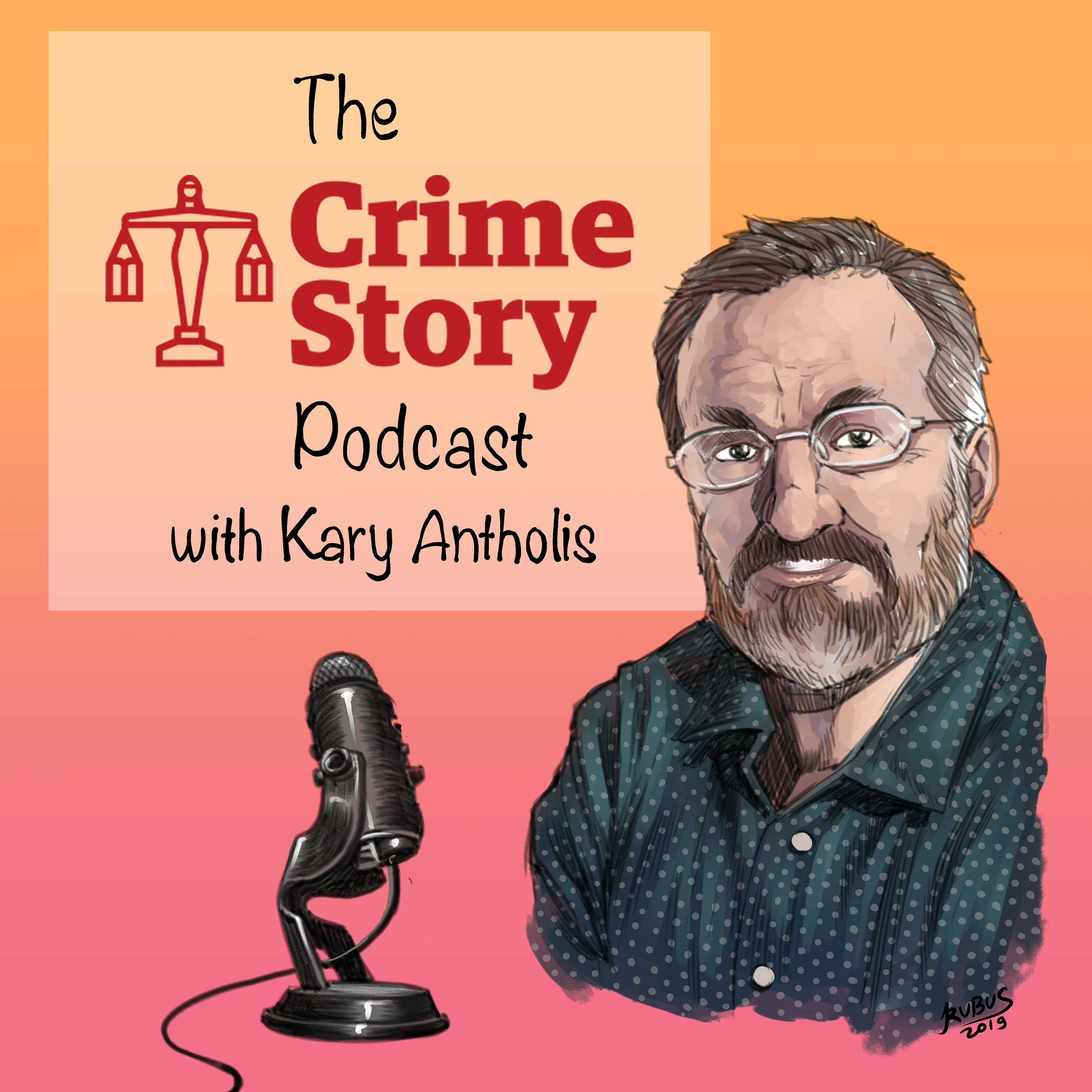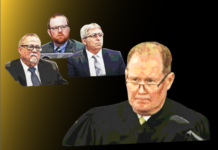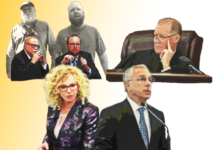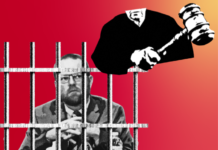On today’s podcast Georgetown Law Professor Paul Butler and I revisit my interview with the Attorney General with the additional perspective of 10 eventful weeks behind us. We also discuss the societal questions raised by the police shootings in Texas. And we begin to examine Professor Butler’s work in the context of his own life experience and in the context of the movement to completely transform the criminal legal process.
Kary:
This is the Crime Story Podcast with Kary Antholis where stories of Crime and Justice are told.
Joining me today on the podcast is Georgetown Law Professor, Paul Butler. As you may recall, Paul joined me on the day we launched Crime Story to offer his perspective on my interview with Attorney General William Barr.
Professor Butler is the author of the widely lauded books “Let’s Get Free: A Hip-Hop Theory of Justice,” and “Chokehold: Policing Black Men.”
Paul is also one of the nation’s most frequently consulted scholars on issues of race and criminal justice. Prior to becoming a professor, Butler served as a federal prosecutor with the U.S. Department of Justice.
On today’s podcast Paul and I revisit my interview with the Attorney General with the additional perspective of 10 eventful weeks behind us. We also discuss the societal questions raised by the police shootings in Texas. And we begin to examine Professor Butler’s work in the context of his own life experience and in the context of the movement to completely transform the criminal legal process.
You can find a transcript of this interview and more Crime and Justice storytelling, news and narrative analysis over at CrimeStory.com.
Kary:
We are joined today by Paul Butler. Paul, thank you for being with us again.
Paul Butler:
Hey Kary, it’s great to be back.
Kary:
When last we spoke, we had just listened to my interview with the Attorney General and during our conversation you expressed some concerns and some questions and perhaps a glimmer of hope about what he might do, but also some deep uneasiness and misgivings. How has the last few months affected your view of the Attorney General and his position on law enforcement and criminal justice reform?
Paul Butler:
The past month, the nation has been embroiled in an impeachment inquiry involving conduct of the President of the United States, and we’re learning that some of President Trump’s mischief in terms of apparently shaking down Ukraine for help with his political ambition, that conduct by Trump has been enabled in some ways by Attorney General Barr. We’ve learned that Trump has this bizarre conspiracy theory that the origins of the Russian investigation has something to do with some kind of conspiracy between the “deep state” and various foreign actors, including people in France and Italy and Ukraine. And part of this bizarre conspiracy theory is that Hillary Clinton’s server has never been discovered. Now it really doesn’t matter because there’s a copy of everything that was in this server. But Trump is convinced that the server is in Ukraine and he thinks it’s the Ukraine because he thinks that a company that was involved called CrowdStrike is operated by a Ukrainian and it’s not operated by Ukrainian.
Paul Butler:
But again, if it’s a bizarre conspiracy theory, I guess the facts don’t really matter. That’s a long-winded way of telling a story about a bizarre conspiracy theory that now the Attorney General of the United States is apparently trooping around the world, making calls to foreign leaders to get their help on investigating this bizarre conspiracy theory. So why would the Attorney General of the United States be doing that dirty work for President Trump? When I think of his comments in the great interview that you did with him for Crime Story, he’s… the most charitable way of putting it… an instrumentalist. He apparently believes that the end justifies the mean. As I talked about earlier, he seemed to support torture, someone being physically hurt, if the result would be information that would be useful in that case to someone who was trying to avenge a crime. And I’m concerned that he is being an instrumentalist with regard to his work for the President of the United States. And so apparently what Trump wants isn’t so much questioned by the Attorney General as implemented. And again, his suggestion to you was “by any means necessary.” And I think we see some of that ethos reflected in what we’re learning about his role in the Ukrainian scandal.
Kary:
I think we’ll end up revisiting the Attorney General in future conversations. But I do want to ask one other question. Given his role in investigating the alternative theories about what happened with the DNC server and CrowdStrike, why would he not have at least commented on questions about his recusal from matters related to Rudy Giuliani and the two former Soviet citizens who have been arrested in that scandal.
Paul Butler:
The Attorney General does not appear to believe in recusals. Before he became the Attorney General and the Trump administration, he’d written a long critique of the Mueller investigation where he said, among other things, that in the ways that Trump was being investigated for obstruction of justice, Trump could not be guilty because Attorney General Barr than a private citizen had this extreme view of executive power and the way that Barr thinks about the power of the Presidency. It’s hard for Barr to see how the President could be guilty of obstruction of justice since in Barr’s view, the President is the boss of the justice system. So it’s not a completely idiosyncratic view of the constitution and executive power, but it is a right wing extremist view. But you might expect since he written and analysis suggesting that as far as he was concerned, the President couldn’t commit obstruction of justice in most cases, that when he became Attorney General and is charged with overseeing an investigation of the President for obstruction of justice, that he might’ve recused himself since he’d already opined on the matter and he refused to recuse himself.
Paul Butler:
And not only did he supervise the case, I think a lot of us think that he worked with Trump to spin the result. And he did that with regard to his first summary of the Mueller report, which was misleading and then accurate in some ways, but certainly I’m sure appreciated it by the President because Barr’s summary of the Mueller report, before the American people had seen it, absolved Trump of both conspiracy/collusion and obstruction of justice. And as we all learned, when we got to read the Mueller report, Mueller had found at least 10 possible episodes in which the President may have committed obstruction of justice. And so when Barr summarily dismissed that, I think he showed his true colors and now declining to supervise an investigation of matters relating to Ukraine, matters that are likely to come up in the congressional impeachment inquiry of Trump… if Barr were to decline supervision there, if Barr were to recuse himself, well then he wouldn’t be able to carry out the President’s will in ways that he seems eager to do.
Kary:
Moving on to several stories that had been in the news lately. I know that you have opined on the firing of the officer that killed Eric Garner. We’ve also had a verdict in the Amber Guyger case. She was convicted of killing Botham Jean, and given what some saw as a relatively lenient sentence of 10 years in prison with the likelihood of her being released, having done half that time, and we’ve just recently had the murder of Atatatiana Jefferson in her own home by an officer with the Fort Worth police department who has since resigned upon threat of firing and has been charged with homicide. What are some of the thematic and societal phenomena that you’re observing both in the outcomes on each of these incidents and in the media response to these incidents?
Paul Butler:
So when the police officer who killed Eric Garner was fired from the NYPD five years after that officer put Mr. Garner in that illegal chokehold, the firing itself was seen as some scant justice. It was scant because what many activists and members of Mr. Garner’s family wanted was for there to be a criminal prosecution of that police officer. And both the state’s district attorney and the United States justice department declined to bring charges in that case. And so for five years after Garner was placed in the choke hole, uh, the cop who did it remained on the force making over $100,000 a year. So limited justice in that case, but frankly, sometimes in cases involving police violence, especially police violence against people of color, limited justice is better than no justice and no justice is the most frequent response.
Paul Butler:
With regard to the police violence in Texas. Amber Guyger who killed Mr. Botham Jean in his own home was convicted of murder. So that’s justice in the way that a lot of activists, people who work on reform of police departments see justice. That with regard to that conviction, at least, a police officer got treated like any other defendant. The jury weighed the evidence and delivered its verdict of guilt. There has been controversy about this sentence. 10 years. And something that I’ve spoken about with my students a lot… Many of our students are folks who are passionate about transforming the criminal legal process. They think that sentences in the United States are way too long, especially if you compare US sentences to sentences in other countries. We’re two or three times, four times more punitive than most other countries that we usually compare ourselves to and so on the one hand, I think a lot of folks thought that 10 years is a long time to be in prison and 10 years might in that sense being an appropriate sentence for Amber Guyger because it reflects the gravity of the harm that she did, but also presents some kind of hope and possibility for redemption that she doesn’t have to remain behind bars for the rest of her life.
Paul Butler:
The concern is that if there were an African American in her position, if there were a Latin X person in her position, there most likely would have been a tougher sentence. And then I think, how should we respond to the fact that Amber Guyger got an appropriate sentence? But it’s one that it’s doubtful that a person of color would have received. And you know, this comes up from time to time… in the Felicity Huffman case, she got a light sentence for fraud in the ways that she and her husband helped their kid get into college. I don’t know, fraud was the exact crime, but the sentence seemed — in the same way — lenient to a lot of folks but also appropriate. And John Legend, the artists who’s an activist on the criminal legal process and reforming and transforming the system tweeted that the response shouldn’t be to hate the sentence that Felicity Huffman got.
Paul Butler:
The response should be to wish that everybody in that situation would get the benefit of that same lean leniency and mercy and understanding from the judge. And I get that. Part of the concern though is how do we get to a place where people of color get the same breaks and benefits that white folks do? And so a theory in opposition to John Legend is that until white folks have to go through what people of color have to go through in the criminal legal process, change won’t happen. So that’s the theory that if Amber Guyger had gotten the book thrown at her, let’s say 25 years to life, then some people might’ve gone, wow, that’s too much. If Felicity Huffman had gotten a couple of years in prison, three to five years, let’s say, then a lot of people might have thought, that’s unfair. If somebody like Felicity Huffman can get that much time for her crime, maybe we ought to rethink sentencing.
Paul Butler:
Maybe our system should be more compassionate. So again, if your theory of how the law changes, how racial justice happens is that white folks have to be empathetic or white folks have to fear it might happen to them, then I get the argument that the sentence that Amber Guyger got is too low because if, basically the response to tough sentencing is to give some white folks a break, but to continue to impose that harshness on black men, black women, and other subordinated people, that’s not acceptable. So again, I think it’s tough. It’s a, it’s, it’s a hard case to know what to make of that sentence. This is the last thing I’ll say about these police cases is you can look at the fact that Aaron Dean of the police officer in Fort Worth, who gunned down Atatiana Jefferson when Ms. Jefferson was just looking out the window… the fact that he’s being prosecuted for murder and that Amber Guyger was also prosecuted and convicted of murder. You could look at those two cases and ask whether there’s a trend and ask whether the trend is that police officers are finally being held accountable when they commit violent acts against black people.
Paul Butler:
I think it’s way too early to call it a trend. And I think they’re also important differences in these cases than in the usual cases in which police officers use violence against black people. In the usual cases they are using violence against someone who they suspect has committed a crime. And sometimes they’re right. That person has committed the crime. And sometimes they’re wrong, but the person is a suspect. Now, the fact that it’s a suspect doesn’t justify unlawful violence, but in a sense from what we know now about Botham Jean, the victim in the Amber Guyger case. He’s what — as a prosecutor — you would call a perfect victim. He’s not a suspect. He’s very relatable. He was literally watching TV and munching on popcorn when Amber Guyger barged into his house and gunned him down. He was a college graduate and had a good professional job. So he is somebody who a lot of folks could relate to as opposed to other people who have been killed by police officers in ways in which some police officers have acted unlawfully.
Paul Butler:
So we can think about a gentleman who sees the police following him, and he jumps out of his car and runs away and the cops shoot him down. Now what that officer did was just as illegal as what Amber Guyger did, but because the victim is someone who was running from the police and who the police suspected of a crime, he’s not as relatable. And again, we’re just learning about the facts in the case in Fort worth with Aaron Dean who gunned down Ms. Jefferson, but in the media version of the story, she’s a young woman who’s babysitting her eight year old nephew playing video games and again, she’s a perfect victim. And you shouldn’t have to be a perfect person, you shouldn’t have to be a perfect victim in order to have justice done, in order to have accountability when the police mess up, when the police mess up big time and kill somebody. So I hope that these two cases herald a new way of thinking about police violence and accountability, but because these two Texas cases are different in important ways from the usual cases, I think it’s too early to tell.
Kary:
Throughout your academic career, you’ve established fairly controversial and provocative ideas for addressing systemic problems, particularly vis a vis the way that people of color are treated by the criminal justice system. Could you speak a bit about the source of your pivot towards these issues and working in the Academy and leaving the world of the prosecutor and then after you give us a sense of what stimulated this, talk to us a bit about how you think about establishing the narrative parameters of the issues that you want to talk about.
Paul Butler:
I became a prosecutor because I wanted to see if I could help change the criminal legal process from inside. So I went in as an undercover brother hoping that I could make a difference. And what I found was that the system was too broke to fix. The only way to have equal justice under the law. The only way to abolish the new Jim Crow is to wholly realign the way that the criminal legal process works Now. I became a prosecutor because I grew up as a black boy in Chicago, and I’d had a number of negative experiences with the cops and it turned out, it didn’t matter that I had gone to Yale for college and Harvard for law school. I still got treated like a black man by the cops. And it shouldn’t have mattered that I went to a fancy school, but in some ways I guess I thought maybe that privilege could insulate me. And I’ve no doubt that it did insulate me, but it didn’t wholly protect me. And so I don’t know if I’d say that there were some selfish reasons that I also was interested in helping from within change the ways that prosecutors looked at people of color. But I’ve no doubt that that was part of it. I wanted to see if I could help the criminal legal process lose it’s laser sharp focus on black men. And what I found was that rather than change the system, the system changed me.
Paul Butler:
I became one of those guys who like my friends now who are African American prosecutors or police officers. I became one of those guys who believed I was doing the Lord’s work as a prosecutor and that I was in some part bringing order to chaotic communities. I was a young lawyer and when I would go to court, I’d say, my name is Paul Butler and I represent the United States. And that was a heady feeling for a 26 year old black man from the South side of Chicago. And I enjoyed that, that power. What I didn’t enjoy was feeling like my work was locking up black men during the approximate year that I spent as a local prosecutor in the District of Columbia. If you were to go to criminal court in DC, you would think that white people don’t commit crimes. You would think that “white people don’t steal, they don’t get into fights, they don’t use drugs, but black people, man those are some bad dudes.”
Paul Butler:
Obviously, I knew better than that and I came to resent the way that my blackness was supposed to be an implicit message to African American jurors and other observers that everything was cool. Why would this young black man be a prosecutor if the system was racist? And so part of the reason I left the prosecutor’s office was this intellectual realization, this process of learning and growing and understanding that the work I was doing wasn’t actually making anybody safer, wasn’t actually bringing any semblance of order to communities of color. And that in fact, it’s hard for a regime of harsh punishment to do that. It’s much more likely that laser focus on black men and black families and the intervention being arrest and prosecution and incarceration, that’s going to destroy families in communities more than build them up. So I started to get that as a prosecutor. The more dramatic reason I left the prosecutor’s office is because after I stopped doing those misdemeanor crimes, I spent the bulk of prosecutorial career doing public corruption at the United States Department of justice. And while I was working on my biggest case, I was the junior lawyer on a prosecution of a United States Senator for public corruption. While I was working on that case, I got arrested and I got prosecuted for a crime that I didn’t commit. So in my first book, Let’s Get Free: A Hiphop Theory of Justice, I tell the whole story of how I came to be arrested and prosecuted and how I took the case to trial because I was innocent and I believed in the jury system and I want folks to actually buy the book or check the book out to their library to find out what happened. But things worked out well.
Paul Butler:
But the reason that things turned out well didn’t seem to have a whole lot to do with my innocence. They seemed more involved with the fact that I had the best lawyer in town representing me, an African American woman named Michelle Roberts. The fact that things worked out well had to do with my status as a prosecutor. Things that shouldn’t have mattered to a jury but probably did. Some of my defense attorney friends get mad. They say it shouldn’t have taken your own personal prosecution for you to see how messed up the system is. But it did kind of take that. I remember when I was prosecuting people, they would say… a defendant would take the stand and say that the cop lied. And as a prosecutor during our cross-examination, I would get all up in his face and I say, “Mr. Jones, you mean the police have nothing to do but make up stories about you?”
Paul Butler:
In my own trial, the cop took the stand and lied his ass off. Why would he do that? I don’t know. In other cases, defendants would say “There are people who really know what happened, but they don’t want to get involved.” In my case, it was a silly dispute about a parking space. And my neighbor who made these allegations against me had had some beef with our mutual landlord about the parking space. So he at least, would be able to shed some light on why she was making up this story or why she thought she had something to do with this parking space, which belonged to my apartment, but he wouldn’t get involved. And so it wasn’t that I had to leave the prosecutor’s office. I was still working on the case against the Senator and they would have preferred that I’d stayed… again, (I was) the junior lawyers, so my leaving wasn’t going to ruin the case, but I didn’t see how I could continue to do that work.
Paul Butler:
What I’ve said is that the experience of being prosecuted made a man out of me. It made a black man out of me. So when you ask about narrative, when I left the prosecutor’s office, I wanted to teach and write and think about what I’d seen and learned during my experience. The three or four years I spent as a prosecutor and I wanted to see if I could transform the system, now. Not through my work on the inside as a law enforcement officer. Now, I wanted to expose what I’d seen and what I learned and part of what I wanted to expose was to policymakers and scholars, but part of it was to everybody else to the body politic because I thought maybe if people just see how the system’s working, maybe that will dispel some of their illusions about “criminal justice.”
Paul Butler:
I don’t even use that phrase anymore. I say “criminal legal process” because there’s nothing just about the system. But I hoped as a legal scholar and educator, I could get folks to understand the urgency of transformation. And so part of my work was going to be making the case for transformation to ordinary people. And you know, better than I, Kary, that ordinary people learn through stories. They learn through narratives about people who they can relate to and situations that, they’ve seen folks in. And so in all of my scholarly writing and popular writing, I want to provide a way in. I want to help people think about folks who are charged with crimes and folks who may even be guilty of crimes in a sympathetic way, in a way that’s different from how criminal suspects are presented on the front page of the New York Post or on some of the sensational TV shows. So in telling those stories, in describing how the process works, In a sense I’m being an advocate even though I’m not making an argument. I do make arguments but sometimes I feel some of the most persuasive stuff is just to let people see how the system works and then they’ll get the need for transformation.
Kary:
One of the things that I’ve observed is that in reading some of the work of your peers, what distinguishes your work is that, while echoing observations about the system that people like Michelle Alexander and James Forman and Emily Bazelon make, you stake out prescriptive ideas for disrupting the process in order to perhaps move towards meaningful change. And two of the examples of that are jury nullification… embracing jury nullification as an idea to be spread… that when people serve on juries, it is their right as citizens to engage in jury nullification. And also the notion of moving towards prison abolition. And I’d love for you to talk a bit about how you come to advocating for those ideas and your awareness of the provocativeness of those ideas and your strategy in embracing them and arguing for them.
Paul Butler:
So you mentioned people who’ve written some of my favorite books about the criminal legal process. So Michelle Alexander, her The New Jim Crow was a game changer. I can’t think of a book that’s been more important in terms of getting people focused on racial justice in the criminal legal process than The New Jim Crow. And of course James Forman, his Pulitzer prize winning book, Locking Up Our Own has helped people understand that of course African Americans want to be safe and that a primary responsibility of government is keeping its citizens safe. And I think James, his book, helped people understand how the state has woefully failed black folks in keeping us safe. And Emily Bazelon’s book about prosecutors… It’s so important because now we have this great new development of people who are running for office in some cities as district attorney’s saying they want to let people out of prison.
Paul Butler:
They want to go after police officers when they break the law. And it’s not a huge movement at this point, but the fact that we have prosecutors who are progressive in cities like Chicago and Philadelphia is a really interesting development. And I think Emily takes a sharp revealing look at progressive prosecutors in her great book. So yeah, in my work, um, I also stake out some provocative views that I hope are supported by the evidence and the argument. So I started writing about jury nullification right after I was a prosecutor and as a rookie prosecutor, I had been warned by experienced prosecutors that in some cases involving drug crimes, if the defendant was a young black man, the black jurors of the District of Columbia, we’re not going to convict him even if they thought that he was guilty. If there was a jury trial and the jury was predominantly African American, which in DC in the 90s was almost always the case, they were going to let that young man go.
Paul Butler:
And when I started trying these misdemeanor cases, it happened all the time. What also happened was that I developed so much respect for these jurors. These were folks who kind of reluctantly showed up to jury duty like most of us, but they were also really proud, I think, to be on a jury because a lot of these folks were from Southern States where 20 years before, black folks just weren’t put on juries and they really did approach their work with a seriousness of purpose, almost a patriotism that impressed me. And so when I started to write, I had to reconcile these two things that seemed in tension. One, that the jurors will let some defendants go, even though they knew they were guilty, and two, that the jurors were trying as hard as they could to be responsible patriots in their jury service and damned if I didn’t reconcile them.
Paul Butler:
What I learned is that what these jurors were doing… jury nullification has actually been a proud part of our Anglo American legal tradition. For a long time. It was a commonplace that jurors were supposed to judge the law as well as the facts. And if in a particular case they thought the law was unfairly applied, the idea was of course they would acquit, find “not guilty” and nullification as a power that jurors had fell out of favor for various reasons in the late 18 hundreds. But even now, the Supreme Court has acknowledged that it’s a power that jurors have to find people not guilty even when that is not supported by the evidence. It’s a power that, based on the Constitution is inherently part of what jurors can do. And that verdicts of not guilty can’t be overturned by any court, even if the judge disagrees.
Paul Butler:
Now, that’s not true with verdicts of guilt. If someone’s convicted and there is persuasive evidence that the person actually didn’t do it, a court can reverse that. So nullification I thought is a way that the people have of responding to a horse criminal legal process. And so I published in the Yale Law Journal in the mid 1990s an article that described what the DC jurors were doing in these nonviolent drug cases. And then went on to encourage that kind of activism and to propose ways that it might even have more impact. And part of what I was doing was criticizing what we were just starting to understand and describe as mass incarceration. And when I say “just starting to understand and describe,” the United States in the late 1980s early 1990s embarked on the largest expansion of our prison population in the history of the world.
Paul Butler:
And so when I was writing about nullification, we were just getting the data, the evidence about how many people were locked up about the exponential increase compared to a couple of decades before. And so the concern I had was that A, too many people were being locked up and B, African Americans and especially young black men were vastly disproportionate victims of this new punishment regime. And during that time, I think it’s ready to say a lot of people didn’t see mass incarceration as a problem, even if they understood it was happening. And there the idea was… that the complaint was that 911 is a joke, right? That was the Public Enemy song that came out in the 1990s. The complaint was that the police weren’t enforcing laws in communities of color because they didn’t care about communities of color. So now that there was this laser focus, some people, including a lot of African American police officers and prosecutors thought that it was actually a good thing that finally the black community was getting attention, protection from the cops and from prosecutors.
Paul Butler:
And so I had to unpack that and explain why all of this law enforcement and incarceration for African Americans wasn’t in the best interest of the community. And it’s not work that I did by myself. A lot of people started to write about it, but I was among the first, and I think especially because of the activists who got involved and the great scholars like Michelle Alexander and James Forman and many others, 25 years later, I think everybody understands the harm that all of this policing and prosecuting has created in the United States and especially in communities of color. So, you know, it’s cool to have been part of a movement that I think has been successful in the sense that now most people understand that we have a major race problem with our criminal legal process and that we have a major social justice problem. And so what I’m focused on now is looking at the work of great scholars and activists like Angela Davis, like Ruth Gilmore, like the women who started The Movement for Black Lives.
Paul Butler:
And these African American feminists are now talking about prison abolition. And when I first heard about it, it sounded crazy to me. And as I first understood what it means. And second also come to understand that the ways that people think about reform of the criminal legal process aren’t going to work at the end of the day. The ways that people have talked about reform, like not sending people to jail for nonviolent drug crimes, like making some misdemeanors, civil infractions rather than crimes. Those aren’t going to make a dent in mass incarceration or in race disparity. So you can’t just tinker with the system. It’s way too broke for that. So abolition done in a responsible way, attendant to public safety is really the only thing that’s going to bring us equal justice under the law. And Kary, I’m hoping, cause I know people see abolition if they’ve heard about it at all, as a really new idea. So I’d love to have another time where we can really delve into it, because it’s something that I think is very exciting and I think it’s on its way and not in five years, not in 10 years, but it’s going to happen. So I would love to think with the Crime Story audience about what it means and how it could work.
Kary:
Let’s do that. Let’s do that. I’ll just put this out there and then maybe this is something that we can pick up next time. Having read people like Malcolm X and Martin Luther King and James Lawson, it strikes me that these ideas like jury nullification and prison abolition, these ideas are kind of deeply rooted in the civil rights history of the United States. And it strikes me that your establishing narrative paradigms around these kinds of issues are akin to what nonviolent protest was in the 60s and the slavery abolition movement was in the 19th century. And perhaps in a subsequent conversation we can reflect on the historical antecedents of the movement that you’re a part of.
Paul Butler:
Yeah. I think that one way of looking at African American history is as a story of resistance, resistance, to law, not the theory of it, but its practice in the United States. And so resistance to slavery, which was authorized by law and is part of the constitution. Then resistance to the old Jim Crow. Thurgood Marshall, the greatest civil rights lawyer of all time mounting a sustained campaign, attacking law, trying to get it transformed. And so I think the Movement for Black Lives is also a story about resistance to law and trying to transform law and policy and practices in the United States. So yeah, that’d be a fun conversation to have.
Kary:
Paul Butler, thank you so much for your time.
Paul Butler:
Great to be here, Kary.






